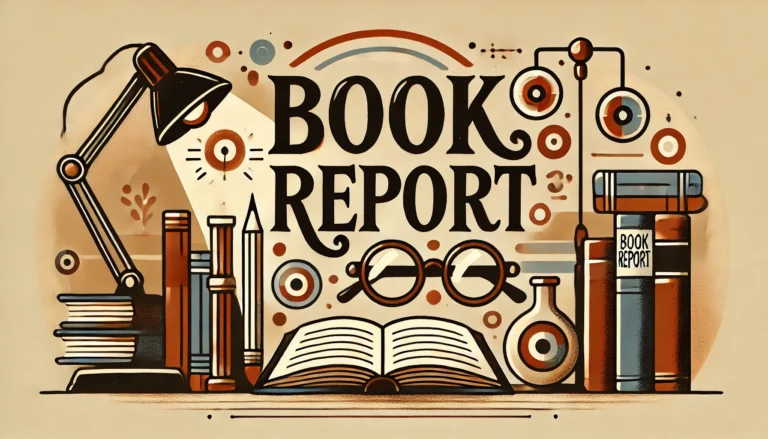Essay Writing Guides
How to Write a Book Report Quickly and Effectively


Writing a book report can be a fascinating journey into literature, offering students and readers a structured way to share their insights and understanding of a book. Whether you’re a student aiming to meet an academic requirement or a budding reader eager to articulate your thoughts about your latest read, mastering the art of book reporting can enhance your analytical and writing skills. This guide will walk you through the steps and elements required to write a comprehensive and engaging book report, ensuring you cover all necessary details, from plot summaries to critical analyses.
A book report serves as a detailed analysis of a book, allowing the writer to delve into the author’s narrative structure, themes, characters, and key messages. It’s not just a summary; it’s an opportunity to engage critically with the text, express personal reflections, and demonstrate a deep understanding of the material. Through this exploration, readers learn to appreciate literature more deeply and communicate their perspectives effectively, which is a valuable skill in any academic or professional setting. Let’s explore what makes a good book report, how it differs from a book review, and how to present your findings cohesively.
What is a Book Report?
A book report is an informative piece of writing that summarizes a book’s content and critically analyzes its themes, characters, and plot. It typically includes an evaluation of the text, discusses the author’s intent, and may provide personal opinions and connections to the reader’s experiences. This task helps develop critical thinking and analytical skills, making it a common assignment in educational settings.

Do You Even Want to Write a Book Report?
Because if you’re reluctant – use our service to simply get the job done.
What is the Purpose of a Book Report?
The purpose of a book report is multifaceted. Primarily, it ensures the reader thoroughly understands the book’s content, themes, and structure. It also helps develop critical thinking and analytical skills by requiring the reader to interpret the text and articulate an informed opinion. Additionally, writing a book report encourages clear and organized writing, supports arguments with evidence, and fosters a deeper appreciation and understanding of literature.
What are the Elements of a Good Book Report?
A well-crafted book report summarizes the book and offers an insightful critique and personal reflection. To achieve this, it is essential to incorporate several key elements that form the backbone of any comprehensive report. The table below outlines these crucial components, each designed to help the reader present a thorough analysis and engage deeply with the text. Use this guide to structure your report effectively and enhance your understanding and appreciation of the book.
Element 📚
| Description 📝
|
Introduction 📘 | Provides basic information about the book, such as the title, author, and publication details, along with a brief overview of the content and the report’s purpose. |
Summary of the Content 📖 | Offers a concise summary of the plot, highlighting the main events and the story’s development without divulging any spoilers or too many details. |
Character Analysis 👥 | Examines the main characters and their relationships, including their development and contribution to the narrative. |
Themes and Motifs 🧠 | Discusses the book’s central themes, messages, and motifs, explaining how they are integrated into the story and what they signify. |
Personal Reflection and Critical Analysis 💭 | Encourages the writer to express their opinion about the book, supported by specific examples and critical insights into the author’s writing style, plot construction, and character portrayal. |
Conclusion 🔚 | Summarizes the writer’s overall impression of the book, reiterates the main points discussed in the report, and possibly provides recommendations for potential readers. |
Citations and References 📚 | Includes any sources used for the book report, adhering to appropriate academic citation standards to acknowledge references and avoid plagiarism. |
How to Write a Book Report
Writing a book report can seem daunting, but you can approach the process with confidence and clarity by breaking the process into manageable steps. Below is a step-by-step guide to help you write a thorough and insightful book report:
- Read the Book
Dive into the book attentively, noting key plot developments, characters, themes, and stylistic elements. A careful, complete reading is crucial to understanding the nuances of the text.
- Take Notes
As you read, jot down important details about major events, character evolution, and thematic elements. These notes will serve as the foundation for your report and ensure you capture all significant aspects of the book.
- Create an Outline
Organize your notes into an outline. This should include an introduction, plot summary, character analysis, theme exploration, and conclusion. Structuring your report helps maintain focus and coverage of all critical points.
- Write the Introduction
Begin your report with an introduction that includes the book’s title, author, genre, and a brief setup of the book’s premise. Include a thesis statement encapsulating your main judgment or perspective on the book.
- Write the Plot Summary
Provide a concise plot summary outlining the main events, the setting, and the primary conflicts. Remember to keep it brief but detailed enough to give a clear picture of the narrative flow.
- Write the Analysis
Analyze the book’s themes, character arcs, and use of literary devices. Discuss how these elements contribute to the overall message or experience of the book. Use specific examples from the book to support your discussion and critique.
- Write the Conclusion
Conclude your report by summarizing your thoughts on the book and its impact. Restate your thesis in light of the analysis provided, and offer any final thoughts on the book’s significance or the reading experience.
5 Tips for Writing a Book Report
- Offer a Unique Perspective: While summarizing the book is important, providing a fresh perspective is equally crucial. Share unique insights or draw comparisons to other literature or real-world events. This approach avoids repetition and enriches the reader’s understanding of the book.
- Stay Concise and Focused: Ensure your analysis is brief and directly related to the elements your audience cares about. Avoid straying into unnecessary details that might dilute the core points of your report.
- Support Your Claims: Every claim or opinion in your report should be supported by specific examples and evidence from the book. This strengthens your arguments and shows your deep engagement with the text.
- Adhere to Formatting Guidelines: Pay attention to the specific formatting requirements, such as the title page, table of contents, page numbers, headings, subheadings, and citations. Proper formatting enhances the professional appearance of your report and ensures it meets academic standards.
- Express Your Views Confidently: Don’t hesitate to share your opinions about the book. A book report is not just a summary; it’s an opportunity to engage critically with the text. Just remember to back up your perspectives with concrete evidence from the book.
Book report vs. Book Review
A book report and a book review are closely related yet distinct forms of literary criticism. While both provide an evaluation of a book, they serve different purposes and audiences. A book report primarily summarizes the book’s content, discussing its plot, characters, and main themes, and is often an educational assignment aimed at demonstrating a reader’s understanding of the text. Conversely, a book review critically assesses a book’s content, style, and overall merit. It is usually intended for a broader audience, including seasoned readers and literary enthusiasts. Reviews are often published in literary journals, newspapers, or online platforms. They are designed to inform potential readers whether to read a book, offering a deeper analysis and personal interpretation of its value and significance.
Book Report Template
The template below provides a comprehensive framework for crafting a detailed and insightful book report, covering all major aspects of the book while engaging the reader with clear and structured content.
📖 Title | [Book Title] |
👨💼 Author | [Author’s Name] |
📚 Genre | [Genre (e.g., Fiction, Non-Fiction, Mystery, etc.)] |
📝 Introduction | Briefly introduce the title, author, and genre. Hook the reader with a captivating sentence about the story. |
📖 Plot Summary | Briefly summarize the main events, focusing on turning points and character development. Avoid revealing the ending! |
👥 Characters | Introduce the main characters and their importance to the plot. Describe their personalities, motivations, and contributions to the conflict. |
🔍 Analysis | (Optional) Explore themes, writing style, or the author’s message. Use quotes from the book to support your points. |
🏁 Conclusion | Briefly summarize your main points about the book. Leave a lasting impression by sharing your thoughts and feelings about the story. |
⭐ Optional | Include a rating (e.g., out of 5 stars). Mention the ideal reader for this book. |
Example Book Report
To provide a clear example of a book report, we’ll look at one on 1984 by George Orwell.
Introduction: “1984” is a dystopian novel by George Orwell, published in 1949. The story is set in a totalitarian society ruled by a party known only as “The Party,” led by a possibly fictitious figure called Big Brother. The novel follows Winston Smith, a low-ranking member of the ruling Party in London, in Oceania. Orwell’s work is renowned for exploring themes such as government surveillance, totalitarianism, and how political manipulation can alter reality, making it a profound critique of the powers of authoritarian regimes.
Plot Summary: Winston Smith grapples with oppression in Oceania, where the Party scrutinizes human actions with the ever-watchful Big Brother. Defying a ban on individual thinking, Winston dares to express his thoughts in a diary and pursues a relationship with Julia, a fellow Party member who shares his dissenting views. As they navigate a world where privacy is obliterated, their rebellion leads them to the dangerous territory of The Party’s all-seeing eye. Their quest for freedom and individuality leads to betrayal, and Winston faces the harsh consequences of disloyalty to the Party, ultimately being forced into a chilling acceptance of authority.
Analysis: Orwell’s “1984” provides a chilling examination of the dangers of totalitarianism. The novel’s portrayal of a world where government overreach impacts each aspect of life serves as a warning and an eye-opener to the psychological manipulation citizens can undergo. Using technology for surveillance in the novel eerily presages current debates around privacy and civil liberties in our digital age. Orwell’s insightful character development and narrative style vividly bring to life the experiences of those living under oppressive regimes, and his exploration of themes like Newspeak, doublethink, and the alteration of historical records highlights the destructive power of manipulated truths.
Conclusion: “1984” transcends the typical narrative of a dystopian novel to deliver a timeless, cautionary tale that remains profoundly relevant in today’s society. It serves as a stark reminder of the fragility of freedoms we often take for granted and the need for vigilance to preserve them against authoritarian threats. Orwell’s masterful depiction of a bleak future where freedom is curtailed under the guise of state security continues to resonate with readers, urging them to question the world and stand firm in their convictions.
Summing Up
Writing a book report is an invaluable exercise for students, enhancing their reading comprehension, critical thinking, and analytical skills. Students gain a deeper appreciation and understanding of literature by dissecting the book’s content and exploring its themes, characters, and narrative structure. This process bolsters their academic prowess and prepares them for more complex analytical tasks in the future.
If you wonder, “Who can write me an essay or a book report?” look no further. Our team of expert writers excels in literature assignments and is dedicated to helping you succeed. Trust us to provide insightful and meticulously crafted reports to meet your educational needs and exceed your expectations.

Do You Even Want to Write a Book Report?
It’s simple – hire a literature writer who knows the source and can fulfill your task!
FAQs
What are 5 parts of a book report?
- Introduction: Includes the book’s title, author, genre, and a brief overview or thesis statement.
- Summary of the Content: Provides a concise plot description, focusing on main events without revealing spoilers.
- Character Analysis: Discusses the main characters and their roles in the story, including their development and impact on the plot.
- Themes and Insights: Explores the central themes, messages, or moral lessons presented in the book.
- Conclusion: Summarizes the analysis and includes personal reflections, evaluations, or recommendations for potential readers.
How do you write a book report format?
- Begin with an introduction that presents essential information about the book and your thesis or central insight.
- Follow with a plot summary that details the story’s key points, keeping it clear and concise.
- Include a character analysis section where you discuss the significant characters and their interactions.
- Discuss the book’s broader themes in a themes and insights section.
- Conclude with a conclusion that restates your main points and provides your final thoughts on the book.
- Optionally, you can add a citation section if you’ve used additional resources.
How to begin a book report?
- Start with a hook that grabs the reader’s attention, which could be an interesting quote from the book, a startling fact, or a provocative question.
- Introduce the book by stating the title and author and providing a brief synopsis of the book’s content.
- Present your thesis statement or the main point of your report, outlining what you will be discussing.
What is a good first sentence for a book report?
- A compelling first sentence for a book report could be: “In [Book Title], [Author Name] weaves a powerful narrative that not only entertains but also profoundly challenges the reader’s perspective on [Theme/Subject].”
- Another example could be: “[Book Title] by [Author Name] plunges into the heart of [Theme/Conflict], presenting a story that resonates deeply in today’s world.”
- Alternatively, you could start with a personal reflection: “Reading [Book Title] was an eye-opening experience that offered a deep dive into [specific aspect or theme of the book].”
Source
Purdue University. Writing a Book Report. https://owl.purdue.edu/owl/general_writing/common_writing_assignments/book_reports.html

